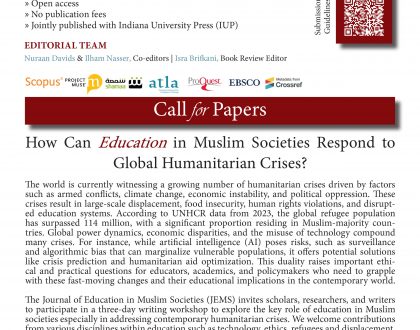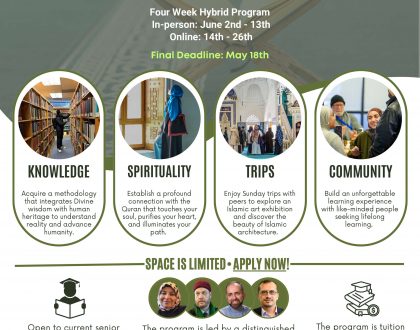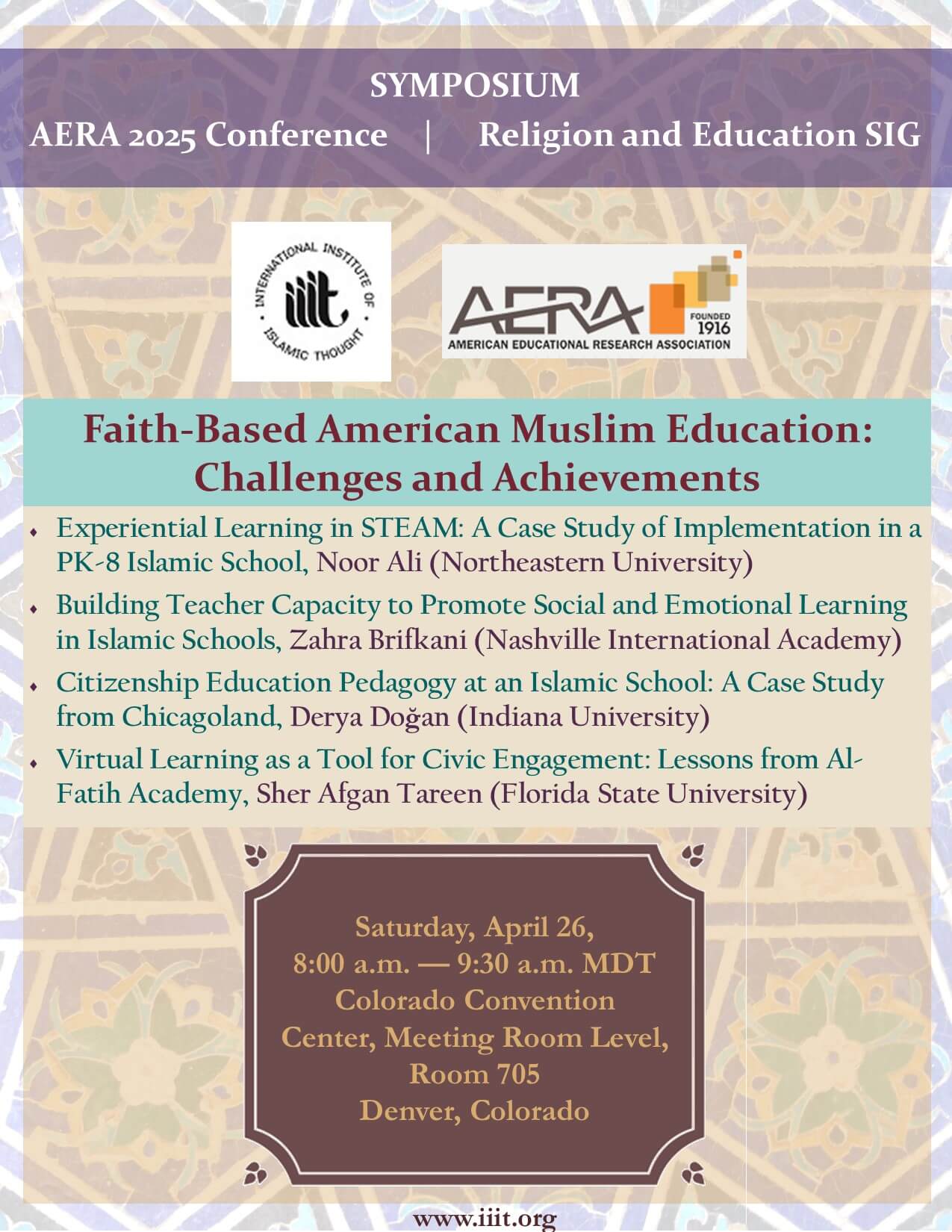IIIT at AERA 2025 Annual Meeting
Faith-Based American Muslim Education: Challenges and Achievements
Session Abstract
This symposium provides an important glimpse into Islamic schools, a growing phenomenon across the U.S. Covering mid-western, southern, and the northeastern regions, the four studies underscore salient topics in education grounded in the contemporary faith-based American Muslim educational context. From experiential learning to citizenship education and from socio-emotional learning to civic engagement, the papers give valuable insights into the day-to-day challenges and achievements as experienced by Muslim teachers and students. They provide researchers and educators useful lessons for pedagogy and practice as well. In doing so, the symposium advances our knowledge of American Muslims in their efforts to preserve their religious beliefs and traditions through schooling while also straddling their multifaceted identities and contributing to the larger society.
Session Summary
The symposium gives a glimpse into Islamic schools, a vibrant part of the American educational landscape. Between 1991 and 2015, Islamic schools in the U.S. experienced an 800 percent rise and recent figures estimate that there are about 300 American Islamic schools that cater to upwards of 50,000 learners (Azmat and Shatara 2023). Considering the growth of mosques in the U.S. (Mohamed 2021), this may be a conservative number. The papers in the symposium cover a range of salient topics in education and shed light on the day-to-day challenges and achievements as experienced by American Muslim teachers and students in Massachusetts, Tennessee, Illinois, and Virginia.
The first paper shares a case study at a PK-8 Islamic school in Massachusetts that is STEM-certified. The study evaluates the effectiveness of experiential learning in enhancing students’ engagement and understanding of STEAM concepts, explore how this approach aligns with Islamic educational principles, and assesses the challenges and opportunities in implementation.
The second presentation focuses on socio-emotional learning at a PK-12 Islamic school in Tennessee. The study examines teachers’ perceptions of the challenges associated with SEL implementation as well as evaluates the effects of teachers’ participation in a professional development and individualized coaching program designed to address these challenges.
The third paper delves into citizenship education at a K-12 Islamic school in Chicago. The study explores the implementation of a pedagogy that promotes participatory citizenship as a case study in order to understand the civic values as defined by the school’s educators and their overall institutional approach to how those values are taught.
The final presentation tackles virtual learning and how a K-8 Islamic school in Virginia strived to imbibe civic engagement in its student body despite the challenges presented by COVID. Against the backdrop of research showing negative outcomes of online learning, this study highlights the successful forging of community through the intentional and dialogic use of technology.
In 2017, the Pew Research Center estimated American Muslim population to be 3.45 million (Mohamed 2018). By 2020, Islamic houses of worship had risen to 2,769, more than double the number in 2000 (Mohamed 2021). Furthermore, researchers assert that the “growth of Islamic centers is closely tied to the growth and evolution of Islamic schools” (Khan and Siddiqui 2017, 108). At the same time, American Muslims continue to face discrimination and negativity (Mohamed 2021) with mosques and Islamic schools becoming a target of Islamophobia (Khan and Siddiqui 2017). In such an environment, this symposium serves as a valuable resource to better understand American Muslims and their efforts to preserve their religious knowledge and traditions. In the process, it also underscores four salient topics in education from the perspective of American Muslims, demonstrating the many ways in which American Muslims straddle their multifaceted identities and contribute to their larger society.
Presentation Abstracts
Experiential Learning in STEAM: A Case Study of Implementation in a PK-8 Islamic School
Noor Ali (Northeastern University)
The landscape of education is continuously evolving, with innovative approaches emerging to enhance student learning and engagement. This study delves into the implementation and impact of an experiential learning approach focused on STEAM (Science, Technology, Engineering, Arts, and Mathematics) in a STEM certified PK-8 Islamic school in Massachusetts. Our research aims to evaluate the effectiveness of experiential learning in enhancing students’ engagement and understanding of STEAM concepts, explore how this approach aligns with Islamic educational principles, and assess the challenges and opportunities in implementing experiential learning in a faith-based educational setting.
While conversations about successful models of experiential learning often point us to creative high schools, we believe it’s time to start earlier. K-8 schools are often placed on the back burner when it comes to experiential learning, with the assumption that occasional art projects and field trips will suffice. Our research challenges this notion, arguing that these formative years, when students are at their most fearless, creative, and curious stages, are crucial for implementing truly experiential pedagogy and inquiry driven learning.
The theoretical framework of this study is rooted in constructivist learning theory and Kolb’s experiential learning cycle. Additionally, it draws on Islamic educational philosophy, particularly the concept of ‘ilm (knowledge). By examining how these theoretical perspectives intersect in practice within a faith-based STEAM curriculum, we aim to provide a comprehensive understanding of the potential for experiential learning in diverse educational contexts.
Through a mixed-methods case study approach, using field notes based on classroom observations, interviews, and evaluation tools, we document the journey of starting small but thinking big. In this session we share how a single lesson, such as animal adaptations in Grade 1, can evolve into a comprehensive, experiential unit. This might involve bird watching expeditions, engineering bird feeders, and engaging with experts in various fields, creating a robust, interdisciplinary learning experience.
Our findings highlight the multifold benefits of this approach. Students demonstrate increased engagement, deeper understanding of complex concepts, and improved problem-solving skills. The integration of Islamic principles enhances the relevance and meaning of STEAM learning, creating a more holistic educational experience. While a major challenge may include the task of balancing experiential approaches with traditional expectations and time constraints for teachers, the study provides insights into navigating these challenges, emphasizing the need to embrace failure, let students take the lead, provide structure, accept productive noise, and ensure equity in expectations and accessibility.
The scientific and scholarly significance of this study includes its contribution to the growing body of research on experiential learning in K-8 education, with a unique focus on its application in a faith-based context. By addressing the gap in literature regarding STEAM education in Islamic schools, we provide valuable insights into culturally responsive pedagogies.
Building Teacher Capacity to Promote Social and Emotional Learning in Islamic Schools
Zahra Brifkani (Nashville International Academy)
The interest in fostering students’ social and emotional skills has significantly increased among scholars, educators, parents, and policymakers. The growing interest is driven by the evident need for students to cultivate these essential skills. This study is a mixed methods action research investigating the implementation of social and emotional learning (SEL) in a K-12 private Islamic school in Tennessee. The study aims to examine teachers’ perceptions of the challenges associated with SEL implementation, which undermine the effectiveness and consistency of the implementation process. Additionally, the study evaluates the effects of teachers’ participation in a professional development and individualized coaching program designed to address these challenges and enhance teacher capacity to support students’ development of social and emotional skills.
The theoretical framework of the study is grounded in Roger’s Diffusion of Innovation theory. Additionally, an Islamically-rooted SEL framework is used in this study. This framework is informed by the Islamic perspective on education, which emphasizes the development of the whole person, It draws on key concepts like Tarbiyah, Talim, and Tadib. Tarbiyah refers to the comprehensive nurturing and training of the child, encompassing social, emotional, and spiritual dimensions. Talim, derived from the Arabic root word ‘ilm, signifies both knowledge and the learning process. Tadib is generally understood as fostering moral discipline.
Acknowledging the variability in the challenges teachers encounter when implementing SEL in their classrooms is crucial for developing effective interventions. Additionally, integrating a spiritual component into SEL instruction and addressing the unique needs of students in Islamic schools poses additional challenges for teachers. As part of this action research, a teacher professional development (PD) program was developed to provide tailored SEL related coaching and support to participating teachers, addressing their unique challenges. Over three months, teachers engaged in multiple PD cycles, collaborating with the researcher to identify challenges, develop strategies, gather resources, implement solutions, and reflect on the process. Through interviews, surveys, observations, and evaluation forms, the researcher documented teachers’ participation in the PD and evaluated its impact on the effective and consistent implementation of SEL in the classrooms.
Analysis of the findings indicates the positive impact of providing teachers with a well-structured professional development program that offers targeted training and supports them in effectively addressing SEL implementation challenges. Findings also indicate that teachers’ participation in the professional development program effectively addressed deficiencies in their knowledge and skills concerning supporting students’ social and emotional needs. Addressing these challenges enhances the quality and consistency of SEL implementation, thereby maximizing the positive impact on student outcomes. This study adds to the growing body of research on bridging the gap between theory and practice in SEL. It offers valuable insights for educators and researchers dedicated to enhancing students’ social and emotional development.
Citizenship Education Pedagogy at an Islamic School: A Case Study from Chicagoland
Derya Doğan (Indiana University)
A generic criticism of private religious education in the U.S. is that they segregate religious communities from the mainstream American society. Muslim schooling is not excluded from this argument with further claims that they encourage their students to show allegiance to their homelands in majority Muslim nations and the wider Muslim world. However, existing few empirical studies show that civic engagement among the graduates of such institutions is higher compared to their public schooled counterparts. To delve deeper into these limited findings, in this study, I explore the implementation of a pedagogy that promotes participatory citizenship at a Chicago based Islamic school as a case study. I aim to understand the civic values defined by their educators and their overall institutional approach to how those values are taught.
As Kymlicka (1995) argues, the modern state is based upon the idea that “a common language and history” are critical for membership in the society (p.77). Within the U.S. context, racial, ethnic, or religious groups can still participate in this shared “societal culture” through the English language while also maintaining their individual traits (p.75); how exactly these smaller communities position themselves and engage with this dominant society is to be analyzed. I argue that their self-established educational institutions are one way of accomplishing this. By using critical theory in education, I ask what students at an Islamic school are learning and how they are learning it (Peca, 2000) to be active citizens.
Data of this study consists of an examination of curriculum across several subject areas (social studies, history, Islamic studies, sciences, language arts, etc.), assessment reports, vision/mission statements, extracurricular activities, school decorations, teacher interviews and classroom observations. By using qualitative content analysis, I intend to understand how Islamic values, English language, and the American context criss-cross each other in the formation of participatory citizenship education that brings realization to students’ membership in the society at local, national, and global levels.
My findings so far indicate that students’ awareness of the dynamics of their city and state are created through engagement with their local Chicago communities through extracurricular activities; they are taught their civics and rights as American citizens by learning American history and constitution. Their global awareness is encouraged as members of the worldwide Muslim community where criticism of and discussions about other majority Muslim nations are not discouraged. All these levels of participation are inspired first and foremost by the Islamic faith which requires its followers to obey the law of the land.
The significance of this study lies in understanding of a culturally responsive pedagogy applied in the 21st century U.S. from the perspective of a faith-based education. Furthermore, Muslims in Chicago, home to one of the most diverse and most-established Muslim populations in the nation, remains understudied. It is critical to examine how this religious minority positions itself in a city that offers varying socio-economic, racial, ethnic, religious, and cultural dynamics as Chicagoans, Americans, and Muslims.
Virtual Learning as a Tool for Civic Engagement: Lessons from Al-Fatih Academy
Sher Afgan Tareen (Florida State University)
The ubiquity of virtual media in the everyday lives of youth has fundamentally altered the ways in which K-12 educators design and implement the curriculum, raising novel questions over the ethics of online learning. Against the backdrop of research on the negative outcomes of online learning on student mental health and academic progress during the COVID-19 pandemic, this study explores why the experiment went so smoothly at Al-Fatih Academy, a private K-8th grade Islamic school in Reston, Virginia (Johnson 2021; Smith 2022). Its overarching goal is to describe how the cultivation of rahma, Islamic term for compassion, is both engendered by and propels an existential American story of remaking a pastoral ideal through the very technological advancements that otherwise threaten to fracture us into warring tribes.
The growing suspicions surrounding virtual learning in the field of K-12 education reflects long standing critiques of technology in academia. Critics argue that technology often fragments communities into binary identities based on gender, class, race, and other social categories. This framing creates an “us vs. them” mentality, leading to echo chambers where stereotypes resurface and empathy declines (Fuchs 2017; Noble 2018). In contrast, cyberfeminists like Plant (1997) and Haraway (1991) embrace digital technology, positing that it has the potential to transform human relationships and challenge gender norms. One of the most contentious norms is motherhood. It is commonly assumed that digital technology alienates mothers from their children, as both parties passively consume the screen to meet societal expectations of their respective identities at the expense of neglecting the quality time needed to nurture their bond (McRobbie 2009; Wood 2021). However, the aspirations of Reston’s developers to design a network of cyber villages where new advancements in digital technology consolidated work, leisure, and family time has empowered the Muslim women educators at Al-Fatih Academy to redefine motherhood. They view it as an active, engaging role that incorporates emotional intelligence for both students and their families into the curriculum, thereby elevating the seemingly domestic role of caretaking and nurturing as essential for professional growth and development.
To thread a link between Reston’s developers and Al-Fatih’s educators regarding a shared vision of a healthy community, I collected the prospective visualizations (images, renderings, and simulations) of Reston before the town was built and conducted fieldwork, shadowing and interviewing Al-Fatih Academy’s principal, and holding semi-structured interviews with teachers, the counselor, and head of Parent Teacher Association. The visuals allude to the resurgence of motherhood in the age of digital technology while the fieldnotes point to an emergent religiosity which the images do not foresee, Islam. Central to the narrative is the daily afternoon zuhr prayers on Google Meet, which allowed all the stakeholders (staff, students, and their families) to sustain fellowship during the COVID-19 lockdowns.
Ultimately, this case study illustrates that technology is not a neutral entity but rather a medium through which women develop specific ritual practices of communicating that are grounded in their insights on emotional intelligence from caretaking responsibilities, thereby redefining motherhood in the educational landscape.
REFERENCES
Azmat, S., and Shatara, L. H. (2023). “The Council of Islamic Schools in North America (CISNA): An Internationally Recognized Accrediting Agency.” Journal of Education in Muslim Societies, 4(2), 116–126. Retrieved from https://scholarworks.iu.edu/iupjournals/index.php/jems/article/view/6142
Fuchs, C. (2017). Social Media: A Critical Introduction. London: SAGE Publications.
Haraway, D. (1991). Simians, Cyborgs, and Women: The Reinvention of Nature. New York: Routledge.
Johnson M. (2021). “Virtual Learning and Its Effects on Student Learning Outcomes: A Longitudinal Study.” Educational Research Quarterly, 18 (3), 301-320.
Khan, S., and Siddiqui, S. (2017). Islamic education in the United States and the evolution of Muslim nonprofit institutions. Edward Elgar Publishing.
Kymlicka, W (1996). “Freedom and Culture.” In Multicultural Citizenship: A Liberal Theory of Minority Rights (pp. 75-106). Oxford, 1996; online edn, Oxford Academic, 1 Nov. 2003. https://doi.org/10.1093/0198290918.001.0001
McRobbie, A. (2009). The Aftermath of Feminism: Gender, Culture, and Social Change. London: SAGE Publications.
Mohamed, B. (2021). “Muslims are a growing presence in U.S., but still face negative views from the public.” Pew Research Center.
Mohamed, B. (2018). “New estimates show U.S. Muslim population continues to grow.” Pew Research Center.
Noble, S. U. (2018). Algorithms of Oppression: How Search Engines Reinforce Racism. New York: NYU Press.
Peca, K. (2000). “Critical Theory in Education: Philosophical, Research, Sociobehavioral, and Organizational Assumptions.” The Educational Resources Information Center. https://files.eric.ed.gov/fulltext/ED450057.pdf
Plant, S. (1997). Zeros and One’s: Digital Women and the New Technoculture. New York: Doubleday.
Smith, D. (2022). “Examining the Relationship between Virtual Learning and Student Wellbeing.” Educational Psychology Review, 28(1), 89-104.
Wood, H. (2021). Motherhood and the Politics of the Emotional Labor of Caring. New York: Routledge.
Recommended Posts

JEMS – Call for papers
April 11, 2025

Integration of Knowledge (IOK) Summer Program 2025
March 19, 2025


